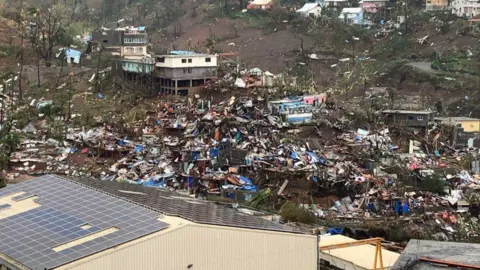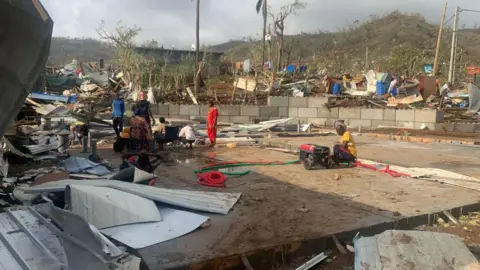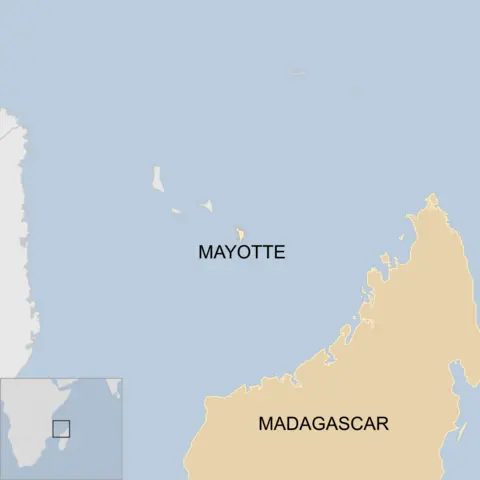The death toll from a cyclone which hit France’s Indian Ocean territory of Mayotte on Saturday is likely to be several hundred, a local official has warned.
Entire communities were flattened when Cyclone Chido made landfall, causing wind gusts of more than 225km/h (140mph).
The last reported death toll stood at 11 but speaking to local media, the island’s prefect Francois-Xavier Bieuville said it will “definitely be several hundred” once the damage is fully assessed, adding it was possible that a “few thousand people had died”.
French President Emmanuel Macron earlier said France would “be there” for the people of Mayotte and was sending 250 rescue workers.
 AFP
AFPFrance’s interior minister Bruno Retailleau said “all makeshift homes have been completely destroyed” and he feared a “heavy” death toll.
On Saturday, one local news source reported that 11 people were killed and 246 injured, based on a hospital report. AFP had reported a higher death toll – at least 14 – citing a security source.
Located north-west of Madagascar, Mayotte is an archipelago comprised of one main island, Grand-Terre, and several smaller ones.
Most of the island’s 300,000 or so inhabitants live in shacks with sheet metal roofs, and tens of thousands of people have lost their homes.
Electricity, water and internet connections are all down. The government in Paris has sent a military transport plane with supplies and emergency workers.
The territory’s Pamandzi airport “suffered major damage, especially to the control tower,” acting French Transport Minister Francois Durovray wrote on X.
Air traffic “will be restored initially with military aid planes. Ships are on the way to ensure resupply,” he added.
Even before the cyclone hit with full force on Saturday morning, there were reports of trees being uprooted, roofs being ripped off buildings and power lines being downed.
The head of Mayotte’s firefighters’ union, Abdoul Karim Ahmed Allaoui, told the BFM news channel on Saturday morning that “even emergency responders are locked down”.
He continued: “There’s no mobile phone service and we can’t reach people on the island. Even buildings built to earthquake standards haven’t held up.
“The emergency services command centre has been evacuated and is functioning at partial capacity.”
 AFP
AFPInterior Minister Retailleau wrote in a statement on X: “I offer my full support to the people of Mayotte. The state and local emergency services are fully mobilized. 110 civil security personnel and firefighters have already been sent and are on site. A second dispatch will be made tomorrow with 140 additional personnel.”
French Prime Minister François Bayrou, who took up the post on Friday, said the cyclone was of “exceptional severity” and he was being updated on the situation “hour by hour”. He has held an emergency meeting in Paris with ministers.
Mayotte was initially placed under a purple alert – the highest level – and a “strict lockdown for the whole population, including emergency services” was imposed. It has since been lowered to red to allow emergency services to leave their bases.
Retailleau said the island had not experienced such severe weather since 1934.

After hitting Mayotte, the storm intensified overnight as it crossed the Mozambique Channel.
The coastal city of Pemba has been battered by heavy rains and winds gusting up to 185km/h (115mph).
Videos on social media showed parts of Pemba city were flooded, trees uprooted and some homes damaged.
The cyclone is now moving inland, with heavy rains reported in neighbouring Nampula province.
While the winds are expected to ease, heavy rain and flooding are also predicted for southern Malawi and later Zimbabwe.
Additional reporting by Richard Kagoe


